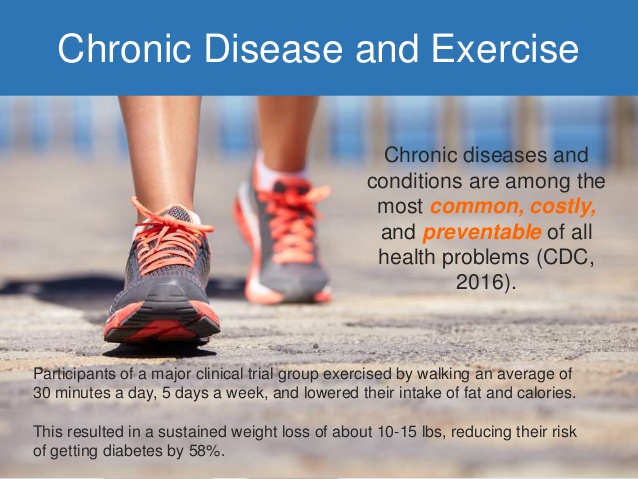Exercise is medicine – and not just preventive medicine. For many conditions – including cardiovascular disease, diabetes and mild-to-moderate depression – exercise can be as effective a treatment as some types of medications.
“Exercise is very beneficial for people with chronic conditions,” says Debbie Childerhose, registered physiotherapist with the Women’s Cardiovascular Health Initiative at Women’s College Hospital. “At present, most disease guidelines presently have exercise as a component of their treatment.”
Research has shown the benefits of exercise for managing chronic conditions:
Exercise is a pillar of cardiovascular rehabilitation, which reduces risk of death or future heart attack. It’s now recommended for all patients after a heart attack or other cardiovascular event.
Exercise helps people with diabetes and pre-diabetes manage their blood sugar levels, among other benefits.
Regular exercise is effective in managing anxiety and mild-to-moderate depression, and in preventing recurrences.
Exercise is recommended for people with musculoskeletal conditions such as osteoporosis and osteoarthritis.
“It’s really important that people get exercise in their lifestyle no matter what their chronic condition is,” Childerhose says.
Some people with chronic conditions may need individual instructions or supervised programs to begin an exercise routine safely. That’s one of the advantages of cardiac rehab: it’s a specialized, supervised program for people with heart disease. People with other conditions – such as osteoarthritis – may feel they can’t exercise because of pain. However, the right exercise program can actually help manage pain, which in turn improves things like mobility and independence.
“At the Women’s Cardiovascular Health Initiative, we have a lot of women who come because of a heart condition, but also have underlying musculoskeletal issues such as arthritis or osteoporosis,” Childerhose says. “After they’ve been doing regular exercise over time, they start to see the benefits in those areas as well as their heart health.”
It’s understandable for people with a chronic condition to have concerns about physical activity, but Childerhose stresses the importance of seeing exercise as part of a treatment plan, rather than a potential risk.
“I get a lot of questions from people who are worried about exercise: worried about the right amount of exercise, worried about getting injured, worried something might be too strenuous on their heart,” she says. “I tell them they’re actually doing more harm to themselves by not exercising. That’s how important it is to get some type of healthy exercise into your lifestyle.”
The chronic fatigue syndrome or CFS is a kind of debilitating disorder which causes extreme fatigue and tiredness. It is not treatable through rest and cannot be explained in the light of any underlying medical condition and hence a major problem.
Causes of chronic fatigue
It is understood what causes chronic fatigue. There are theories stating that it is triggered by psychological stress, viral infection and a combination of different factors which vary from one individual to another. Since no particular cause is still identified and many infections and diseases produce similar symptoms, it can be very difficult to diagnose. According to the reports of the Center For Disease Control and Prevention, chronic fatigue is the end stage of numerous health disorders rather than a single problem.
Diagnosing chronic fatigue
The chronic fatigue is one of the most challenging conditions to diagnose. There are no lab tests for screening the disorder and many symptoms of the chronic fatigue are similar to other conditions. The best way to be sure that an individual is suffering from fatigue is to rule out the possibilities of other disorders like major depressive disorder, hypothyroidism, multiple sclerosis, fibromyalgia, lupus, Lyme disease and mononucleosis.
Treating chronic fatigue disorder
At present, there is no particular cure for the chronic fatigue syndrome. Every person who is affected with the disease manifests different symptoms and thus, may require different treatment options which can manage the disease and relieve the symptoms. Some of the most prevalent treatment options for chronic fatigue include-
Home remedies and changes in lifestyle: Making proper lifestyle changes can bring about positive impact. One should try to limit and even eliminate the caffeine intake which can aid a better sleep and ease your insomnia. It is important to avoid sleeping during daytime. Another effective way is to go to bed at the same time and wake up at the same time each morning as a fixed routine.
Therapy: Two types of therapies can help the people suffering from the chronic fatigue disorder. The first one is psychological counseling which helps in coping with the problems and improving the mindset. Another option is physical therapy where a physical therapist can aid in creating a daily routine and carve out an exercise plan which gradually increases the intensity. This is termed as the graded exercise therapy or GET and it helps the patients suffering from chronic fatigue syndrome cope up with the difficulties.
Medications: It is important to note that no single medicine can treat all the symptoms of the chronic fatigue disorder. The symptoms can alter with the passage of time and may also trigger depression. The experts may recommend antidepressant for combatting it. In case the lifestyle changes fail to offer a restful sleep in the night, the doctor may also suggest a mild sedative. Sometimes, pain reliever is also suggested so that the affected individual can manage the joint pain caused by the chronic fatigue.
These are a few of the most common treatment options for chronic fatigue and helps in effective management of the disorder.










